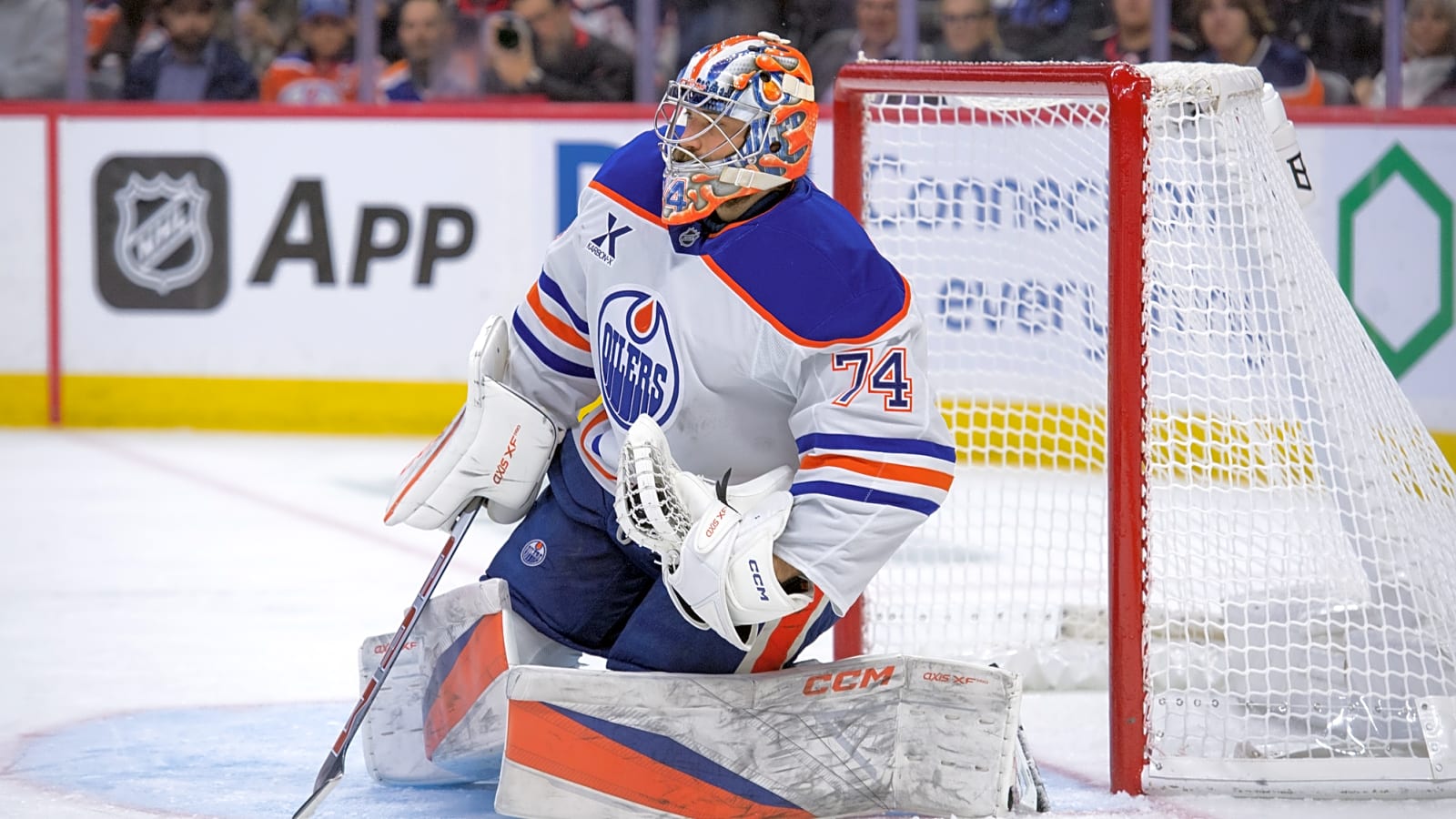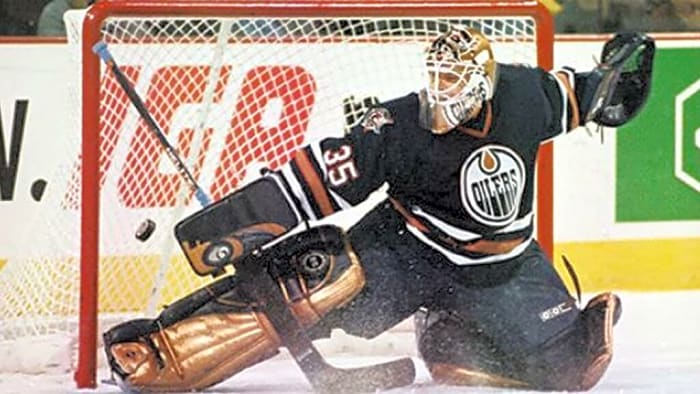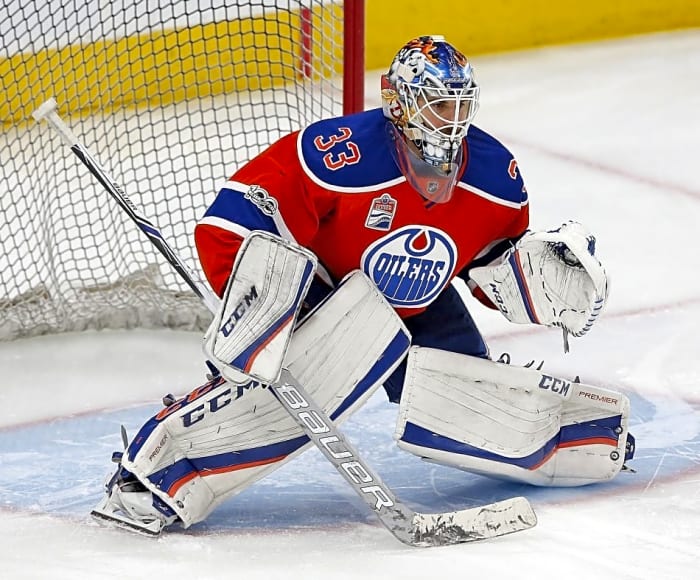
With a 3-2 overtime victory over the Ottawa Senators earlier this week, Edmonton Oilers goaltender Stuart Skinner became the sixth netminder in team history to reach the 100-win mark.
Born in Edmonton, the Oilers drafted the 26-year-old 78th overall in the 2017 draft from the Lethbridge Hurricanes. After another season in junior and two full seasons in the minor leagues, Skinner made his National Hockey League debut in 2020-21. This was his first win, but he allowed five goals on 38 shots in his one and only NHL game that season.
Skinner played most of the 2021-22 season in the American Hockey League, but played 13 games with the Oilers, where he picked up six wins. During the 2022 off-season, the Oilers went out and signed Jack Campbell, which yielded less-than-ideal results.
Campbell’s struggles accelerated Skinner’s development, making him the team’s number one after just 14 games. Skinner went on to win 29 games that season, followed by 36 during the 2023-24 season, and 26 in 2024-25. Through five games in 2025-26, he’s won two games and is looking good between the pipes.
The question is, who are the other five netminders, and how did their Oilers careers go?
Grant Fuhr
Grant Fuhr is undoubtedly the best netminder in the Oilers’ franchise history. Fuhr was the main netminder during the dynasty season, totalling four Stanley Cups while also being a part of the 1990 Oilers (more on that in a bit).
Drafted eighth overall in the 1981 draft, the Spruce Grove native played 10 seasons with the Oilers, accumulating 226 wins, along with 117 losses and 54 overtime losses or ties. In the modern day, his .883 save percentage doesn’t look great, but most of Fuhr’s seasons as an Oilers were spent in the high-scoring 80s.
On top of four Stanley Cups, Fuhr won the Vezina once in 1988 and finished as a runner-up three more times. He also earned Hart votes in the 1987-88 season, as he posted an .881 save percentage and 3.43 goals against average in 75 games.
The netminder was traded shortly before the start of the 1991-92 season, alongside Glenn Anderson and Craig Berube. Fuhr went on to play nine more seasons, retiring after the 1999-2000 season. In 2003, he was elected to the Hall of Fame.
Bill Ranford
Fuhr missed a large chunk of the 1989-90 season, with Bill Ranford filling in. Ranford was nothing short of spectacular in the 1990 postseason, posting a .912 save percentage in 22 games en route to the Oilers’ fifth Stanley Cup (and their most recent until 2026, hopefully).
Ranford was acquired in a trade before the 1988 trade deadline from the Boston Bruins for another goaltender we’ll discuss soon. The netminder served as a backup to Fuhr in his first two seasons, but took over the reins in 1990-91, where he earned his only All-Star nod.
The Brandon, Manitoba native spent parts of 10 seasons with the Oilers, posting an .887 save percentage and 3.51 goals against average in 449 games. He accumulated 167 wins, along with 193 losses and 54 overtime losses/ties.
Ranford was traded back to the Bruins during the 1995-96 season and played for the Washington Capitals, Tampa Bay Lightning, and Detroit Red Wings over the next three seasons. The netminder returned to the Oilers in 1999-2000, playing 16 games where he had a 4-6-3 record, before retiring shortly after.

Tommy Salo
During the 1999-2000 season, Ranford served as the backup to Tommy Salo, one of the most underrated netminders in Oilers’ history. Drafted 118th overall by the New York Islanders, the Oilers traded Mats Lindgren and a pick in the 1999 draft to acquire him in March of 1999.
In his first full season with the Oilers, Salo posted a .914 save percentage and 2.33 goals against average in 70 games played, finishing the year with a 27-28-13 record. That season, he made the All-Star game and finished sixth in Vezina voting.
He followed up the 1999-2000 campaign with another solid year in 2000-01, where he had a 36-25-12 record and .904 save percentage, finishing seventh in Vezina voting. Salo earned his way to his second All-Star Game in 2001-02, posting a .913 save percentage in 69 games with a 30-28-10 record.
Unfortunately, Salo’s play slipped in 2002-03, managing to pick up 29 wins, but finishing with a sub-.900 save percentage for the first time in his Oilers career. After 44 games in 2003-04, he was traded to the Colorado Avalanche and made just five more appearances in the NHL.
With the Oilers, Salo had a 147-128-51 record in 333 games, with a .906 save percentage and 2.44 goals against average. What could’ve been if he hadn’t allowed that long-ranged goal in the 2002 Olympics?
Andy Moog
Circling back to the aforementioned Ranford trade, the Oilers sent Andy Moog to the Bruins in return for Ranford. Drafted in the seventh round of the 1980 draft, Moog is one of three Oilers’ netminders with 100 wins that was drafted by the team.
The Penticton, British Columbia native played 15 games between his first two seasons, before playing 50 games in the 1982-83 season. That year, Moog finished with a 33-8-7 record, finishing fifth in Vezina voting.
His playing time decreased in 1983-84, playing 38 games with a 27-8-1 record. Moog played a similar number of games in the 1984-85 season, finishing the season with a 22-9-3 record. The netminder finished seventh in Vezina voting and was a first-time All-Star.
Moog was also an All-Star in 1985-86, playing 47 games where he had a 27-9-7 record, finishing eighth in Vezina voting. His final season with the Oilers was in 1986-87, where he once again finished eighth in Vezina voting thanks to a 28-11-3 record, the lone season as an Oiler where he had double-digit losses.
In seven years with the Oilers, Moog had a 143-53-21 record. He played six seasons with the Bruins, four with the Dallas Stars, and one with the Montréal Canadiens, finishing his career after the 1997-98 season.

Cam Talbot
All four of the goalies already mentioned are intertwined in a way. Fuhr is their best goalie, but Ranford took over for him and even won a Conn Smythe for his performance in the 1990 postseason. Ranford was acquired from the Bruins in exchange for Moog, who was Fuhr’s prior backup. When Ranford returned to the Oilers late in his career, he backed up Tommy Salo.
There’s no link to Cam Talbot. After Salo’s departure, the Oilers were left searching for a netminder, eventually landing on Dwayne Roloson. While Roloson didn’t reach 100 wins with the Oilers, he did help lead them to the 2006 Stanley Cup Final before his injury.
After Roloson, the Oilers signed Nikolai Khabibulin, who didn’t work out well for them. By this time, Devan Dubnyk was playing well and earned the starter role, until he struggled to start the 2013-14 season and was promptly traded, a very poor decision, even at the time.
The Oilers experimented with five other netminders in 2013-14, an incredibly fascinating season for the Oilers. After another season of trying to find their goalie, they finally pulled the trigger on a netminder at the 2015 draft, acquiring Cam Talbot.
Talbot posted a .917 save percentage in his first season as an Oiler, a .919 save percentage in his second season, and a .908 save percentage in his third season. Unfortunately, Talbot struggled in 2018-19, where he had an .893 save percentage before the Oilers shipped him off to the Philadelphia Flyers for Anthony Stolarz.
In 227 games with the Oilers, Talbot finished with 104 wins, 95 losses, and 19 overtime losses. His .912 save percentage as an Oiler is the second-highest for any Oiler netminder with 20 or more games played.
Talbot’s best season by far was in 2016-17, because on top of a .919 save percentage, the netminder played 73 games and finished fourth in Vezina voting. Now 38 years old, Talbot is still active as he plays with the Detroit Red Wings.
Notable goalies without 100 wins as an Oiler
The netminder with the highest save percentage as an Oiler with more than 20 games played is Mike Smith. Unfortunately, Smith finished with just 56 wins in the 99 games he played. Mikko Koskinen spent time as his backup, and he finished with 83 wins, the seventh-most in Oilers history.
Roloson was the last player born in the 1960s to play in the NHL, and he finished his Oilers’ career with 78 regular season wins in 193 games played. Curtis Joseph is another notable Oilers’ netminder who didn’t finish with 100 wins with the team, finishing with just 76 in 177 games with the Oilers.
In 171 games, Dubnyk finished with 61 wins and a .910 save percentage, the third-highest for any Oilers’ netminder with 20 games played for the team. I can’t emphasize just how poor the decision was to trade him, even at the time.
Lastly, current Oiler Calvin Pickard ranks 12th in all-time Oiler wins, as he’s won 35 games as an Oiler in 61 games.
More must-reads:
- Capitals' Alex Ovechkin one goal away from previously unimaginable milestone
- Contender or pretender? Analyzing five surprisingly hot NHL starts
- The 'World Series home run leaders' quiz
Breaking News
Trending News
Customize Your Newsletter
 +
+
Get the latest news and rumors, customized to your favorite sports and teams. Emailed daily. Always free!








